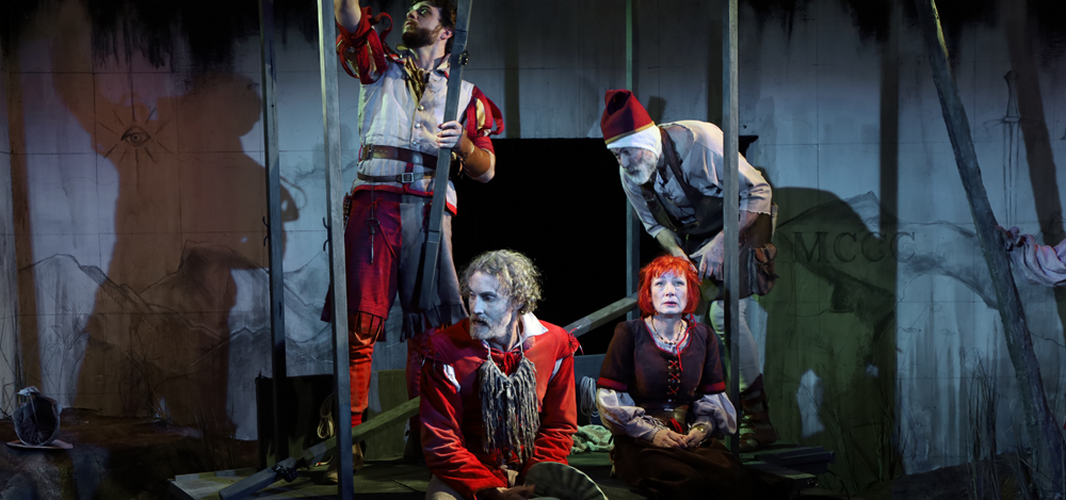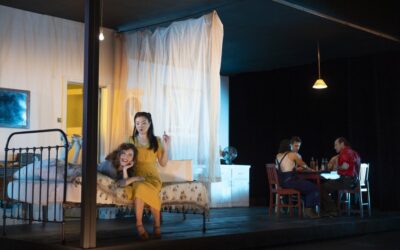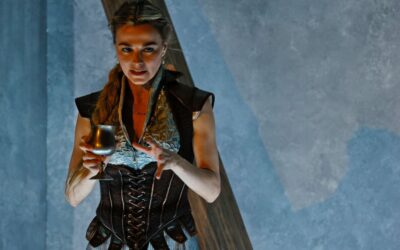By Darby Turnbull
Jordan Harrison’s The Amateurs is one of those excellent plays that allows one to sit with doubt, ambiguity and indecision. For example, I’m not entirely sure if I liked it, but I respected its ideas and was most definitely entertained by it.
Harrison’s 2019 text is undoubtedly prescient (there’s even a character called Rona); telling the tale of a group of travelling players during the bubonic plague in the 14th century. Sadly, he wrote it based on his feelings of being a young gay man in the 90’s having his sexuality informed by the threat of HIV and AIDS and the stigma, prejudice and misinformation surrounding impressionable youths discovering that their identities were inextricably linked with disease and death. But also how artists in times of crisis are essential for entertainment and the uplifting of spirits, but considered expendable when it comes to their actual livelihoods.
The players themselves, a motley crew of recognisable theatrical archetypes, seem lifted straight out of Ben Elton script (ala Blackadder or Upstart Crow) Larking (Dion Mills), the pompous actor manager who’s sleeping with the misanthropic seen it all and over it actress, Rona (Olga Makeeva). Darcy Kent as Brom the deep and brooding closeted gay actor, Emily Goddard as Hollis the earnest young actress searching for meaning in her work whilst playing women written without dimension, new actor in the company, the dashing Psychic replacing Henry who succumbed to illness (Khisraw Jones-Shukoor) and Gregory, the maligned designer who acts as a wise truth telling ‘fool’ (in the old fashioned sense a derogatory term for people with developmental disorders). Harrison has tremendous fun recreating the bitchy, bitter backstage banter with their hierarchies, conflicts, shifting alliances and illicit secrets alongside the challenges of putting together a ramshackle production with limited resources; things like cast members falling ill and dying and sourcing paint, props and conflicts over design.
Susie Dee is a natural choice to helm this production; her collaborations with Patricia Cornelius, as they do here emphasize her gift for evoking the dour humour of the disenfranchised in constant proximity to peril. Her and her assistant, Ibrahim Halacoglu imbue the production with raw humanity amidst gorgeous recreations of 14th century theatrical conventions in the Players adaptations of biblical tales.

This is not the first time I’ve reflected on this but every time I attend Red Stitch they’ve raised the bar in terms of the creativity and ingenuity of their design within the snug stage space. Dann Barber’s period set and costume designs, both in and out of the internal performance, are a triumph; vibrant colours that have been suitably aged and withered paired with some spectacular masks. There was many a gleeful response at the recreations of 14th century special effects for the stage and given that things have to ‘go wrong’ in the development of performance it’s a testament to the skill going on behind the scenes to make theatrical chaos go smoothly. Rachel Burke’s (assisted by Max Woods) lighting and Ian Moorhead’s Sound are likewise a feast for the senses combining natural and supernatural moods.
Harrison’s text, as I said before embraces cerebral unknowingness and he himself has elected not sustain the Medieval world he’s created and decides late in the play to go meta by inserting his authorial voice represented by the actors. At a key moment of high drama the house lights go up and Brian Lipson enters the stage in modern dress a “faithful reproduction of his drab, post-hipster Brooklyn uniform” to represent Jordan Harrison providing a mid-play lecture on context for the play, his process and reflection on the legacies that led to its development. Discovering one of his teachers was gay when he had no representation of what that might mean for his future prospects and the tragedy of that same teacher dying of AIDS years later and the formative experience of radicalization, community action and individualization. In the time the play is set, the individual is a concept that is yet to take on the significance of today and he makes profound connections between those intersections.
Lipson, is as usual superb at capturing the sensitivity and self-deprecating humor of the writer, slightly bashful at his gall but also delighting in the spotlight. But is equally matched by Emily Goddard who steps in with her own speech about the actors’ process in finding their own motivations amidst the existential mind fuck of the underwritten character. Goddard is one of our most exciting and unpredictably visceral performers; her every movement and inflection are infectious their energy and drive. This sequence is undoubtedly the soul of the play and it can’t help but overwhelm what has come before and after despite the strength of the production because from my experience Jordan Harrison hasn’t matched the potency.
In addition to Goddard and Lipson, who are equally good in their regular characters; Lipson’s gentle snarkiness as the misunderstood Gregory and Goddard’s palpable grief and loss (her brother died in the plays earliest moments); but this is truly and ensemble of some of our finest character actors. Khisraw Jones-Shukoor brings a charming, dignified presence after a long period offstage as the latest addition to the company and potently a closeted Jew when Jews are being persecuted on a mass scale.
Olga Makeeva brings sublime gruffness to Rona, who has nary a nice word to say to anyone but some hilariously poisonous putdowns. As an unwed pregnant woman she’s acutely aware of the precariousness of both her and her fetus’ mortality and Makeeva is especially strong at conveying her underlying terror.
Darcy Kent has a ball in two conflicting roles; understated as the closeted gay actor quietly mourning his lover and succumbing to his own illness whilst maintaining a nobility and then a heightened, hysterical malignancy as a palace guard.

Finally Dion Mills is an absolute scream as pompous actor/manager Larking, who has of course cast himself as God in Noah’s Arc and is delicious in his tempestuous tantrums, vain posturing and self-deceiving attempts at sincerity. His comic timing is naturally pitch perfect but it’s in his moments of haunting knowledge at just how precarious they are in the societal pecking order.
The Amateurs is an invigorating exercise in introspection and reflection about our own places in communities and history paired with some stunning, old fashioned stage design that I hope captures the attention of awards committees and audiences who are need a break from projections and strobe lighting.





